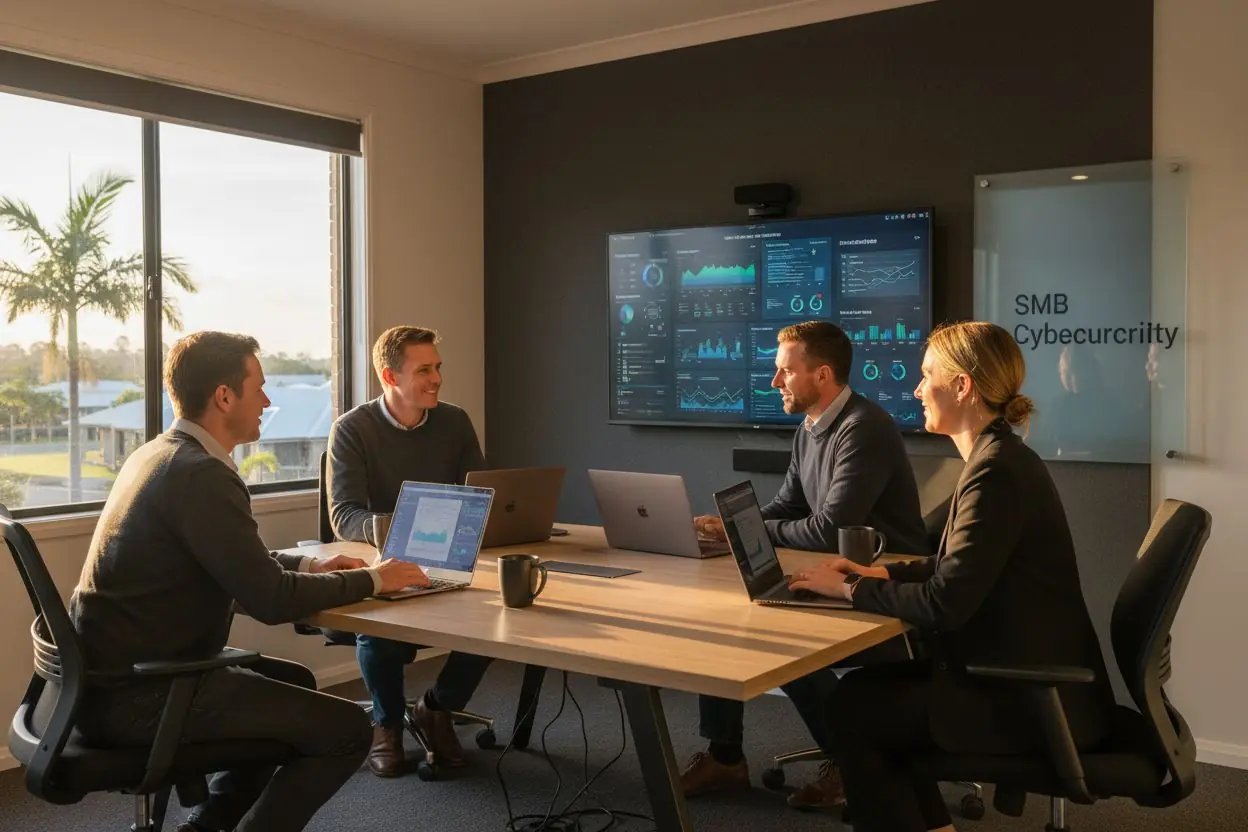Cybersecurity has become a daily concern for every small business in Queensland, and the risks just keep getting bigger. Some reckon only big corporations need to worry about hackers or data breaches, but that is out of date. Queensland businesses lose millions every year to cybercrime and most attacks actually target smaller companies. People never expect their own business will be next, yet the reality is that even a minor breach can turn everything upside down.
Table of Contents
- Defining Cybersecurity For Small To Medium Businesses
- The Importance Of Cybersecurity In Today’s Business Landscape
- Common Cyber Threats Facing SMBS And Their Impact
- How Cybersecurity Measures Protect Your Business
- Building A Culture Of Cyber Awareness In Your Team
Quick Summary
| Takeaway | Explanation |
|---|---|
| Cybersecurity is essential for SMB survival. | Protecting systems from cyber threats is crucial for small to medium businesses in Queensland to avoid significant financial losses. |
| Implement multi-layered security strategies. | Employ various protective measures such as network monitoring and employee training to safeguard digital assets effectively. |
| Regularly train employees on cybersecurity. | Ongoing awareness programs help employees recognize threats and adhere to best practices in digital security management. |
| Recognise and address specific cyber risks. | Understanding unique vulnerabilities specific to your business is key to developing tailored and effective cybersecurity measures. |
| Create a culture of cyber awareness. | Encourage all staff to engage in cybersecurity practices, fostering a proactive environment to defend against cyber threats. |
Defining Cybersecurity for Small to Medium Businesses
Cybersecurity represents a critical protective strategy for small to medium businesses operating in Queensland’s digital ecosystem. At its core, cybersecurity involves protecting computer systems, networks, programs, and data from digital attacks, unauthorized access, and potential breaches that could compromise sensitive business information.
Understanding Digital Protection Fundamentals
For Brisbane-based SMBs, cybersecurity is not just a technical requirement but a fundamental business survival mechanism. Cyber threats can emerge from multiple sources including external hackers, internal human errors, and sophisticated digital infiltration techniques. According to the Australian Cyber Security Centre, businesses lose millions annually due to cybercrime, making proactive protection essential.
Key components of SMB cybersecurity typically include:
- Network protection mechanisms
- Data encryption strategies
- Employee training programs
- Regular security vulnerability assessments
Strategic Protection for Business Assets
Business owners must recognise that cybersecurity extends beyond installing antivirus software. Read more about comprehensive cybersecurity approaches that protect digital infrastructure. Effective cybersecurity involves creating a holistic approach that addresses potential vulnerabilities across technological, human, and procedural domains.
For Queensland businesses, this means developing robust protocols that safeguard critical information, prevent unauthorized system access, and maintain operational continuity. Small businesses are particularly vulnerable because cybercriminals often perceive them as having weaker security infrastructure compared to larger enterprises.
Understanding your specific cyber risks, implementing targeted protective measures, and maintaining ongoing vigilance are crucial steps in developing a comprehensive cybersecurity strategy that protects your business’s digital ecosystem.
The Importance of Cybersecurity in Today’s Business Landscape
In the rapidly evolving digital environment of Brisbane and Queensland, cybersecurity has transformed from an optional technical consideration to a critical business imperative. Small to medium businesses face increasingly sophisticated digital threats that can potentially derail operations, compromise sensitive data, and inflict significant financial damage.
Economic and Operational Risks of Cyber Vulnerability
The financial implications of cybersecurity breaches are substantial. Research from the Australian Cyber Security Centre indicates that cybercrime costs Australian businesses billions annually. For SMBs, a single significant breach can result in devastating consequences that might include:

- Immediate financial losses
- Reputation damage
- Potential legal liabilities
- Disruption of business operations
Moreover, Queensland businesses are not immune to these challenges. Cybercriminals increasingly target smaller organisations precisely because they often have less robust security infrastructure and are perceived as easier targets.
Building Resilience Through Strategic Protection
Effective cybersecurity is about more than preventing attacks it is about creating a comprehensive risk management strategy. Learn about essential data security strategies that can help protect your business ecosystem. Organisations must develop a proactive approach that includes continuous monitoring, regular vulnerability assessments, and adaptive security protocols.
Business leaders need to recognise that cybersecurity is not solely an IT department responsibility. It requires a whole-of-organisation commitment, involving employee training, clear protocols, and a culture of digital awareness. By investing in comprehensive cybersecurity measures, businesses can protect their digital assets, maintain customer trust, and ensure operational continuity in an increasingly complex technological landscape.
Common Cyber Threats Facing SMBs and Their Impact
Small to medium businesses in Queensland face a complex landscape of digital threats that can compromise their operational integrity and financial stability.
Understanding these potential risks is crucial for developing robust defensive strategies and protecting business assets.
Sophisticated Cyber Attack Mechanisms
Research from the Australian Signals Directorate reveals that cybercriminals continuously evolve their tactics to exploit vulnerabilities in business systems. The most prevalent threats for Brisbane SMBs include:
- Phishing attacks targeting employee email accounts
- Ransomware that locks critical business data
- Social engineering techniques
- Malware infiltration through unprotected networks
These digital threats can emerge from multiple channels, targeting not just technological infrastructure but also human vulnerabilities within organisations. Cybercriminals often view smaller businesses as easier targets with potentially weaker security protocols.
Financial and Operational Consequences
The impact of these cyber threats extends far beyond immediate technological disruptions. Learn about the most critical SMB cybersecurity challenges that can significantly impact business operations. A single successful cyber attack can result in substantial financial losses, reputational damage, and potential legal complications.
For Queensland businesses, the stakes are particularly high. Cyber incidents can disrupt critical business functions, compromise sensitive customer data, and create long lasting economic challenges. Small businesses often lack the extensive resources of larger corporations to quickly recover from significant digital breaches, making proactive protection strategies essential for sustainable business continuity.
The table below outlines the most common cyber threats faced by small to medium businesses in Queensland and explains the possible consequences for each threat.
| Cyber Threat | Description | Potential Impact |
|---|---|---|
| Phishing attacks | Deceptive emails aimed at stealing data | Data theft, financial loss, system breach |
| Ransomware | Malware that locks business data for ransom | Business disruption, monetary payout |
| Social engineering techniques | Manipulation of staff via digital interaction | Unauthorised access, data compromise |
| Malware infiltration | Malicious software entering unprotected networks | System damage, operational downtime |
How Cybersecurity Measures Protect Your Business
Cybersecurity measures serve as a comprehensive shield designed to protect businesses from complex digital threats, creating multiple layers of defence that safeguard critical technological and informational assets. For Queensland SMBs, these protective strategies go beyond simple technical solutions and represent a holistic approach to digital risk management.
Strategic Defensive Infrastructure
Research from the Australian Cyber Security Centre highlights the importance of multi layered cybersecurity approaches. These comprehensive protection mechanisms typically include:
- Network monitoring and intrusion detection systems
- Advanced firewall configurations
- Endpoint protection software
- Regular security vulnerability assessments
Effective cybersecurity requires a proactive rather than reactive approach, focusing on preventing potential breaches before they can cause significant damage. This means continuously updating security protocols, understanding emerging digital threats, and implementing adaptive defence mechanisms.
Comprehensive Protection Strategies
Explore our detailed guide on comprehensive cybersecurity protection that addresses the unique challenges faced by small businesses. Cybersecurity measures work by creating multiple defensive layers that intercept, analyse, and neutralise potential security risks before they can penetrate critical business systems.
For Brisbane based businesses, this involves implementing robust technological solutions alongside strategic human training. Employees become the first line of defence, learning to recognise potential digital threats, understand secure communication protocols, and maintain vigilant digital practices. By combining sophisticated technological tools with comprehensive staff education, businesses can significantly reduce their vulnerability to cyber attacks and protect their most valuable digital assets.
Building a Culture of Cyber Awareness in Your Team
Creating a robust cybersecurity culture transcends technological solutions and requires active engagement from every team member in a Queensland business. Cyber awareness is not a one time training event but an ongoing commitment to protecting organisational digital assets.
Foundations of Cyber Awareness Training
Research from the Australian Signals Directorate demonstrates that human behaviour represents the most significant vulnerability in cybersecurity systems. Effective cyber awareness programs must address multiple dimensions of digital risk understanding.
Key elements of comprehensive cyber awareness training include:
This table summarises the key components of an effective cyber awareness training program for staff, as discussed in the article.
| Training Focus Area | Purpose |
|---|---|
| Recognising phishing tactics | Help staff identify fraudulent communications |
| Password management best practices | Encourage strong and secure password use |
| Identifying suspicious communication | Flag unusual digital activities or requests |
| Handling sensitive information | Promote safe and secure data practices |
- Recognising potential phishing and social engineering tactics
- Understanding password management best practices
- Identifying suspicious digital communication patterns
- Knowing proper protocols for handling sensitive information
Embedding Security into Organisational DNA
Discover strategies for maintaining comprehensive data security that transform cybersecurity from a technical requirement into a cultural imperative. Successful cyber awareness programs go beyond mandatory training sessions by creating an environment where every employee understands their role in maintaining digital security.
For Brisbane businesses, this means developing interactive training modules, conducting regular simulated cyber threat exercises, and creating clear communication channels for reporting potential security incidents. By normalising conversations about digital risks and empowering employees with practical knowledge, organisations can build a collective defence mechanism that significantly reduces the likelihood of successful cyber attacks.

Ready to Safeguard Your Business from Cyber Threats?
If reading about digital risks and cybersecurity gaps has you worried, you are not alone. The truth is, many Brisbane SMBs underestimate the severe consequences of a cyber incident. Phishing emails, ransomware, and a growing web of online threats can disrupt more than your systems; they can shake client trust, cause financial loss, and make ongoing compliance much harder. This article explained why basic antivirus is not enough and why a whole-of-business approach is now critical to protect your assets and operations.
IT Start brings hands-on expertise and deep local knowledge to help businesses like yours stay ahead of constantly shifting cyber risks. With managed IT support and certified cybersecurity solutions, you can stop worrying and regain control. Our team focuses on proactive defence, practical training for your staff, and simple pathways to smarter compliance. Do not wait for a breach to learn the hard way. Contact IT Start today and book your free assessment. Let us protect what matters most, so you can focus on growing your business with confidence.
Frequently Asked Questions
What is cybersecurity for small to medium businesses?
Cybersecurity for small to medium businesses involves protecting computer systems, networks, programs, and data from digital attacks, unauthorized access, and breaches that could compromise sensitive information.
Why is cybersecurity crucial for SMBs?
Cybersecurity is essential for SMBs because they face increasing digital threats that can disrupt operations, compromise sensitive data, and lead to significant financial losses. Proactive protection measures are vital for business survival.
What are some common cyber threats faced by SMBs?
Common cyber threats include phishing attacks, ransomware, social engineering tactics, and malware infiltration. These threats can exploit vulnerabilities in both technology and human behaviour within the organisation.
How can SMBs build a culture of cyber awareness?
SMBs can build a culture of cyber awareness by implementing ongoing training programs that educate employees on recognizing digital threats, understanding password management, and knowing the proper protocols for handling sensitive information.



